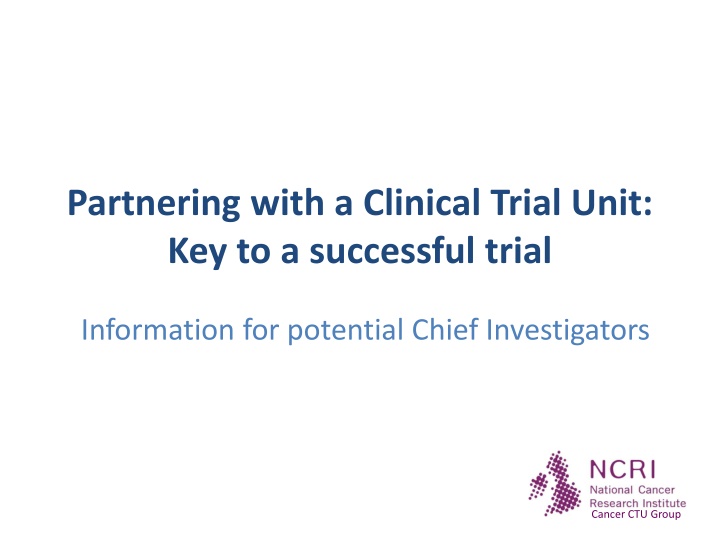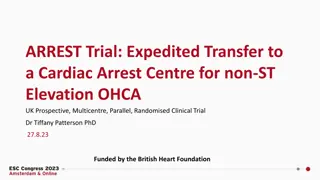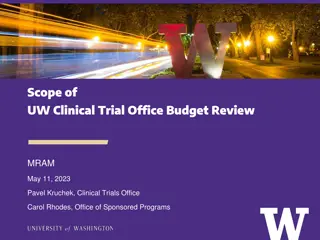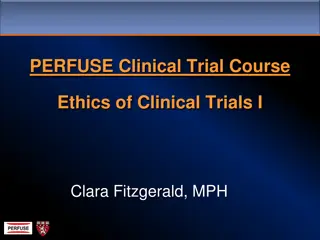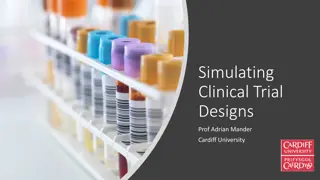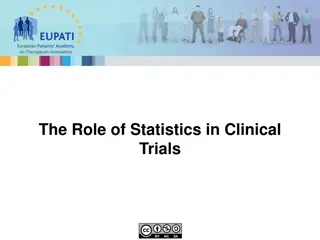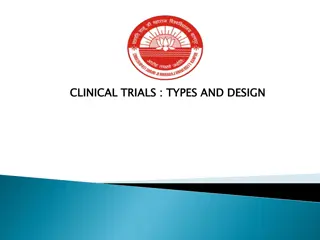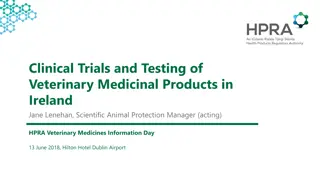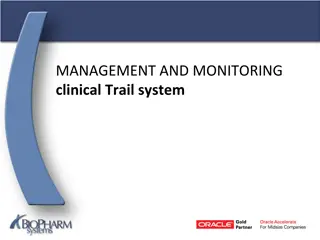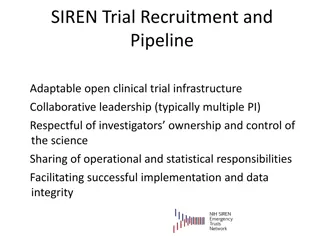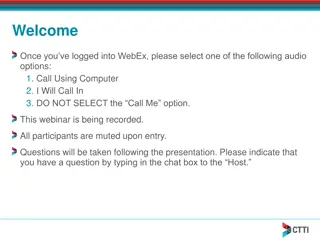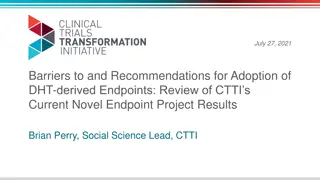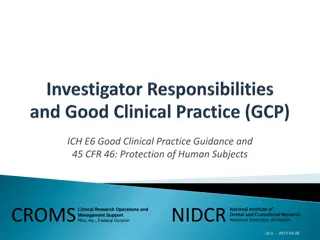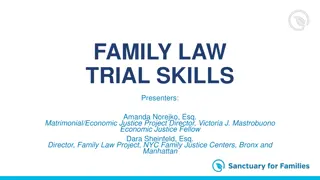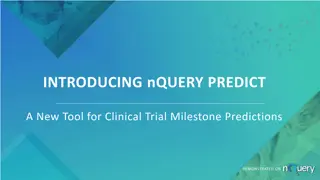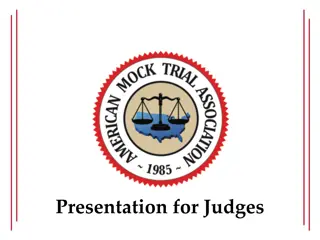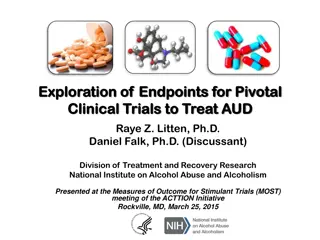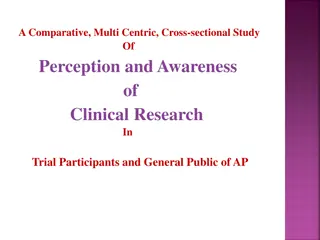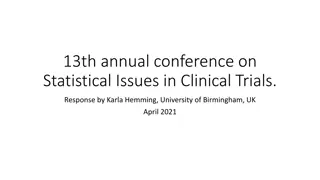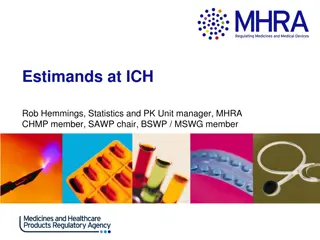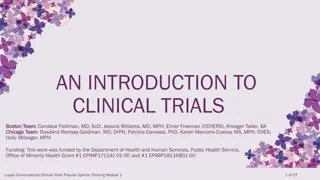Key Aspects of Partnering with a Clinical Trial Unit for Successful Trials
Understanding the role and benefits of partnering with a Clinical Trial Unit (CTU) is essential for potential Chief Investigators. A CTU handles various aspects of trial coordination, from developing trial materials to overseeing regulatory permissions and data management. UK Clinical Trials Units (CTUs) play a crucial role in ensuring the quality and success of multi-centre trials. Maintaining key relationships with sponsors and leveraging the expertise of CTUs can significantly enhance the efficiency and effectiveness of clinical trials.
Download Presentation

Please find below an Image/Link to download the presentation.
The content on the website is provided AS IS for your information and personal use only. It may not be sold, licensed, or shared on other websites without obtaining consent from the author.If you encounter any issues during the download, it is possible that the publisher has removed the file from their server.
You are allowed to download the files provided on this website for personal or commercial use, subject to the condition that they are used lawfully. All files are the property of their respective owners.
The content on the website is provided AS IS for your information and personal use only. It may not be sold, licensed, or shared on other websites without obtaining consent from the author.
E N D
Presentation Transcript
Partnering with a Clinical Trial Unit: Key to a successful trial Information for potential Chief Investigators Cancer CTU Group
Summary What is a CTU? What does a CTU do / not do? Why work with a CTU? What are the benefits of partnering with a CTU? When to engage with a CTU What to expect from the CI role CTU = Clinical Trial Unit CI = Chief Investigator
UK Clinical Trials Units (CTUs) Infrastucture 47 National UK Clinical Research Collaboration Registered CTU s 15 NCRI Registered CTU s with expertise in cancer
UKCRC CTU Registration Full registration key core competencies Track record of coordinating multi-centre Randomised Controlled Trials (phase II-IV) or other well-designed studies Presence of core team expert staff to develop and support studies Presence of robust quality assurance systems and processes to meet appropriate regulations and legislation Evidence of longer-term viability capacity for trials coordination development/maintenance of a trials portfolio core funding or evidence of a rolling programme of grants evidence of commitment from the host institution Provisional registration have recognised expertise working towards full registration
Key Relationships Sponsor
What do CTUs do? Organise launch meetings & conduct initiations of participating sites Develop all trial materials incl. protocol and PIS ConceptAdvise on trial sample size calculations Conduct statistical analyses according to pre-defined analysis plans Set-up Conduct Analysis & Reporting concept and trial design Provide a randomisation service Conduct risk assessment Review available literature to inform Provide on-going oversight & advice to participating sites Obtain regulatory, ethics and global NHS permissions Arrange, contribute to and administer Independent Data Monitoring Committee (IDMC) meetings Monitor & administer site payments Ensure appropriate sponsorship arrangements Centrally collate and enter data Conduct feasibility assessments Oversee contract negotiations and development Review data for completeness & accuracy - chasing data & querying where necessary Provide statistical reports for IDMC meetings Manage completion of grant application Ensure appropriate arrangements for treatment allocation and labelling & distribution of trial drugs Conduct central and on-site monitoring Calculate research costs Conduct additional exploratory analyses as agreed by the TMG Develop newsletters & promotes the trial Develop trial materials & guidance notes for investigator & pharmacy files Help Identify & address barriers to timely recruitment and conduct Contribute significantly to drafting of manuscripts, abstracts and presentations Manage pharmacovigilance activities in accordance with regulations Ensure appropriate arrangements for sample collection and tracking Arrange, contribute to and administer Trial Management group (TMG) and Trial Steering Committee (TSC) meetings Administer the submission of manuscripts, abstracts and presentations Develop plans for data management, central and on- site data monitoring and statistical analysis Maintain trial approvals Present at (inter)national symposia as required Develop CRFs & trial database Prepare reports for funders, regulators, sponsors etc Develop databases to track and monitor data & sample flow Maintain essential documentation Facilitate audits & regulatory inspections Funding Period
Trial Development Process Research Question Literature Review, Protocol Working Group Agree Design CTU Agree to Conduct Trial Identify Sponsor, CI, Consumer Input Design Trial Finalise Outline Proposal, Calculate Research Costs, Confirm Interest Outline Proposal to Potential Funder, Sponsorship Negotiations Prepare Outline Proposal Assess Interest, Confirm Collaborators, Formulate Associated Sub- Studies e.g. QoL, Translational Funding Approval, Protocol Development, Draft PIS/IC, Risk Assessment Prepare Full Funding Application Finalise: Protocol, PIS, IC Sub-Studies Prepare: GP Letter, CRFs, Database construction, TMF, Trial Operating Procedures (TOPs)/Guidance (TOGs)/Guidance Notes (TGNs), Site Investigator/Pharmacy File Obtain: EudraCT, ISRCTN, Sponsor Numbers, Update NCRN Website, Contracts, Drug Supply, Drug Labelling Trial Set Up Apply for Regulatory Approvals Obtain Approvals: Sponsor, MREC, CTA, CSP, R&D Local Investigator Site Accreditation and Initiation Open Trial PIS = Patient Information Sheet IC = Informed Consent CRF = Case Report Form TMF = Trial Master File CT = Clinical Trial Application CSP = Coordinated System for NHS Permissions
During the Trial Regulatory Submission, obtain approvals, circulate to sites Literature Review, Safety Update, Expert Input Amendments Monitor trial recruitment against expected recruitment rate Promote trial recruitment at sites, regular contact/meetings Recruitment Prepare annual reports for submission to regulatory bodies/funders/ collaborators/ presentations Prepare regular reports for trial oversight committees Open Trial Trial Closure Reporting Pharmaco- vigilance & Quality Assurance Monitoring visits, onward reporting of SUSARs, submit annual DSUR Review of SAEs, monitoring trial safety data and risk/benefit ratio Trial team oversight, review of milestones and trial finances Provide training, hold regular trial oversight meetings Trial Management SAE = Serious adverse event SUSAR = Suspected unexpected serious adverse reaction DSUR = Development safety update report
End of the Trial Sent to sites and regulatory authorities Trial Closure Notification Closedown sites, reconciliation of drugs and trial documentation Site Closure Prepare end of study reports to regulatory bodies/funders Reporting Statistical analysis and publication of final trial manuscript End of Trial
What CTUs dont do Interface with patients Other than sending out patient reported outcome questionnaires eg quality of life Store, label dispatch IMP s, ATIMP s or biological samples Although processes may be managed by CTU IMP = Investigational Medicinal Product ATIMP = Advanced Therapy Investigational Medicinal Product
Why Work with a Registered CTU? Grant success rate some funders require it! Core infrastructure support - before grant funding Expertise Trial design Contract negotiation Trial costing Navigation through regulatory requirements Risk assessment Avoidance of preventable problems Ready made systems and procedures
Working with a CTU As a CI you are expected to have detailed knowledge of every part of the study and the CTU is critical in ensuring that every area is covered. The CTU is essential...one needs the expertise that is available, running all the way from the finances, planning, protocol writing and regulatory issues. Daniel Hochhauser Professor in Medical Oncology UCL / UCLH CI: PANTHER
Working with a CTU Working with the CTU helped me to turn my academic ideas into practical reality. Nothing was ever "no". It was always just about how long, how many, how often, how much etc. Instead of being another constraint, their pragmatic approach was, paradoxically, freeing." Adele Fielding Professor in Haematology UCL / Royal Free Hospital CI: UKALL 14 & UKALL 60+
Alternatives to working with a CTU? Research Design Service (RDS) Help with trial design /sample size only Consider how you will manage Ongoing statistical support /analysis Sponsorship Contracts negotiation and sign off Regulatory support etc Database creation and management Staffing including training & supervision needs Initiation, monitoring, safety reporting Patient and public involvement
Funding Success CTU s have proven track record Know what a fundable application looks like 25% of HTA & CR UK grants are funded 74% of CTAAC grants applications funded when NCRN CTU partnered application* CTU s are familiar with trial costings risk assessment CTU s assist with completing the application *UKCRC CTU Oversight Group Review of CTU Capacity - Nov 2008 HTA = Health Technology Assessment CTAAC = Cancer Research UK s grant awarding committee until 2015
The view of the Funding Committees It s very clear when high quality funding applications have been developed in collaboration with a CTU. Even proposals of scientific merit risk being turned down if the trial conduct, costings and trial design are not well presented. David Sebag-Montefiore Professor in Clinical Oncology St James s Institute of Oncology, Leeds CI: ARISTOTLE & CR07 Former Chair CR UK CTAAC
The view of the Funding Committees What makes you look favourably on an application? Even though the applicant may be new, it's important that the group who they collaborate with has a good track-record and are experienced. Similarly, it is important to gain help from a clinical trials unit that is experienced in running such trials. Mark Saunders Consultant Clinical Oncologist Christie Hospital Manchester Former CR UK CTAAC member
Access to CTU Infrastructure Why is this important? Trial lifespan longer than duration of the grant Non-grant funded activity eg contract negotiations Specialist advice eg regulatory Staff training and continuity Accumulated knowledge and experience eg problem solving/ troubleshooting
Contribution of Core and Project Funded Staff to Direct Trial-related Activities Analysis & Publication Development 100% Set up Accrual Follow-up Long term Follow-up 100% Core funded staff 50% 50% 50% 50% 20% 80% 20% 80% Project funded staff UKCRC CTU Oversight Group Review of CTC Capacity - Nov 2008 Core activity is essential in underpinning and enabling Project-specific activity and ensuring development and delivery of projects is maintained and is conducted to highest quality. Core activity not necessarily carried out by full time core staff. Often staff are partly funded through core and partly through project specific funding.
Appropriate Trial Costing What impacts on cost? Risk of trial monitoring requirements Phase of trial Duration Intervention Research costs to sites eg Trial specific assessments Number and location of sites eg International sites Sub studies eg QoL Sample collection Central QC pathology, imaging etc
Getting the funding right As an investigator you are keen to start ASAP, but sometimes its wise to delay an application for funding; that way you submit the best possible application and haven t missed the chance for funding by a rushing. The CTU team advice makes your study better and more likely to be funded. Maria Hawkins Associate Professor and Honorary Consultant Clinical Oncologist Oxford University Hospitals NHS Trust CI: CHARIOt, SPARC & ABC07
Getting the funding right The CTU will provide important information on costing, including all the hidden costs that may not be obvious to the new CI. They will guide you through the (sometimes confusing) definitions of research vs treatment costs. If all costs are not considered and applied for then it could prevent a study from proceeding smoothly. Charlotte Coles Consultant Clinical Oncologist Cambridge University Hospitals NHS Foundation Trust CI: IMPORT HIGH & LOW & PRIMETIME
Grant funding Why do CTU s vary? Core support from funder may reduce cost Institutional overheads
CTU Funding requirements Why does it cost so much? Staffing (FTE depending on trial complexity) Trial manager Statistical support Database construction Data management Regulatory and Quality Management Running expenses Computer, software, etc Administrative costs
Non-CTU costs Site costs Intervention IMP distribution Translational research Don t ask for too little Underfunding impacts on trial success Understaffed Patient safety at risk May cause delays Unethical!
CTU Director Quote Beyond having a good question it s important to engage with a CTU from the outset in order to ensure that all the vast regulatory and financial landscape can be addressed and to maximise the chances of successfully delivering the trial and obtaining a top quality answer to the question Professor Robert Jones Professor of Clinical Cancer Research Director: CR-UK Clinical Trials Unit Beatson Oncology Centre Glasgow
CTU Director Quote The consequences of not involving a CTU in the early stages of negotiations with Pharma can lead to problems with underfunding and a lack of clarity on who is responsible for what eg. who owns the data, who can publish what. This can lead to major problems and delays Professor Jonathan Ledermann Professor in Medical Oncology Director: CR UK & UCL Cancer Trials Centre
Negotiating with Industry How can a CTU help? Prior experience with a variety of companies Understanding the pitfalls Requesting realistic funding Contract negotiation Understanding the wider implications Investigational Medicinal Product management What works
When to engage with a CTU? Right from the start! Why? It s not just about trial design Contracts Costings Navigating the regulations
Working with a CTU at concept stage The worst case scenario of not working with a CTU from concept stage is that the study even if funded, is then undeliverable due to fundamental methodological flaws. A more common situation is that the trial design is suboptimal and it takes a huge amount of work to modify it. The CTU brings an enormous amount of expertise and are not just there for advice on the power calculation! Charlotte Coles Consultant Clinical Oncologist Cambridge University Hospitals NHS Foundation Trust CI: IMPORT HIGH & LOW & PRIMETIME
Working with a CTU at concept stage The aim of the CTU is to help you design and run the best study possible and CTU staff time is allocated to your study. Once they know what the trial is about they help you a lot with feasibility, funding, regulatory, statistics questionnaires etc. Maria Hawkins Associate Professor and Honorary Consultant Clinical Oncologist Oxford University Hospitals NHS Trust CI: CHARIOt, SPARC & ABC07
Engaging the right CTU Factors to consider CTU Expertise and track record Likely funder Disease area Intervention Setting eg primary care, international etc Methodology How to find out Ask around http://www.ukcrc-ctu.org.uk/
Engaging with CTUs Key questions to ask a CTU Will CTU collaborate if there is only one site? there are international sites? the trial is sponsored by Pharma? the trial is high risk? they haven t previously worked in disease area, setting etc? the trial is already funded?
What types of trials do CTUs take on? Depends on the CTU! CTU s are the best option if the trial is multicentre involves an Investigational Medicinal Product (AT/IMP) is high risk is in a disease, trial intervention / outcomes area in which the CTU already has expertise
CI vs PI What s the difference? Principal Investigator: responsible for the conduct of the trial at their site Chief Investigator: responsible for the overall design, conduct (at all sites) and reporting
CI vs PI Taking on the role of a CI is a significant step up from PI..... David Sebag-Montefiore, Professor in Clinical Oncology St James s Institute of Oncology, Leeds CI: ARISTOTLE & CR07
CI vs PI What s the difference? Additional responsibilities Trial oversight / management of whole trial Protocol development and trial design Funding Trial Master File and all essential documents Data base validation and data management Regulatory submission and compliance Ethics submission Risk assessment / Safety / IMP Oversight Annual / End of trial Reports
CI vs PI : How different is it? I think its quite different. The role was primarily what I expected but there was much that I did not anticipate, particularly the amount of detail you must be aware of as the CI such as pharmacy, toxicities etc. You have to be really willing to take full responsibility. Daniel Hochhauser, Professor in Medical Oncology UCL / UCLH CI: PANTHER
Time Commitment for CIs Prior to funding Very variable but start >3 month ahead of deadline It can take over a year to determine the right design Post funding Estimate 2-4 hours a week - very variable Allow time to establish good working relationships CTU staff TMG Site PI s Availability for troubleshooting Queries on eligibility, protocol, safety etc
Time Commitment developing idea Its a time consuming process and it took a lot more time (to develop the protocol) than I had anticipated because of the company s strategy, emerging knowledge about PK and side effects. Daniel Hochhauser, Professor in Medical Oncology UCL / UCLH CI: PANTHER
Time Commitment : open trial I m personally spending around 3- 4 hrs a week on issues relating to the study and that can be more or less on other weeks. We have regular 1hr fixed meetings every 2 weeks with the CTU. Daniel Hochhauser, Professor in Medical Oncology UCL / UCLH CI: PANTHER
Partnership working with a CTU Be prepared for regular meetings, inquisitive questions and suggestions. Listen, think and learn! Initially things can be a bit hard but working as a team becomes easier (and is sometimes fun). Maria Hawkins Associate Professor and Honorary Consultant Clinical Oncologist Oxford University Hospitals NHS Trust CI: CHARIOt, SPARC & ABC07
Communication with CTU As a CI you will receive many e-mails from the CTU every month. You will need to be able to reply in a timely manner and prioritise your work accordingly. As the CI of ARISTOTLE (actively recruiting) I have a teleconference with the CTU every 3-4 weeks. David Sebag-Montefiore, Professor in Clinical Oncology St James s Institute of Oncology, Leeds CI: ARISTOTLE & CR07
What should you expect from a CTU? Trial Design and Funding applications Expertise in trial design and good track record in obtaining funding Trial Expertise Support and guidance in preparing ethics applications Protocols, case report forms and essential documents Trial coordination, database development and data management Communication and Reporting Kept informed of issues at sites Preparation of trial reports for relevant committees and bodies Preparation work for publications and presentations Compliance Navigation through relevant clinical trial regulations and guidance Best practice in clinical trial conduct from design to final publication Risk management
What will a CTU expect from you? The 4 C s Collaboration Academic CTU s are partners not service providers Communication Keep CTU in the communication loop eg messages for funder, R&D, REC s, MHRA, Investigators etc Clinical input Timely input and review of clinical issues from protocol queries to safety reviews Compliance Comply with CTU & Sponsor SOP s and policies to ensure compliance with appropriate clinical trial regulations, guidance and funder requirements eg formation of Trial Steering Committee s (TSC s)
Acknowledgements Concept and Construction of Slides Helen Meadows Cancer Research UK & UCL Cancer Trials Centre Claire Snowdon Institute of Cancer Clinical Trials Research & Statistics Unit (ICR-CTSU) Additional thanks to All chief investigators Sue Tebbs Comprehensive CTU @ UCL for slides 11, 46, 47 Senior Staff at Cancer Research UK & UCL Cancer Trials Centre Institute of Cancer Clinical Trials Research & Statistics Unit (ICR-CTSU) Cancer CTU Group
